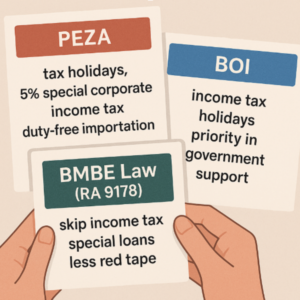business registration in the Philippines, how to register a business, DTI registration, SEC Philippines, BIR registration, startup compliance, business incentives Philippines, PEZA, BOI, BMBE law
business registration in the Philippines, how to register a business, DTI registration, SEC Philippines, BIR registration, startup compliance, business incentives Philippines, PEZA, BOI, BMBE law
business registration in the Philippines, how to register a business, DTI registration, SEC Philippines, BIR registration, startup compliance, business incentives Philippines, PEZA, BOI, BMBE law
Why Registering Your Business in the Philippines Isn’t Just for Show (It’s Your Business’ Glow-Up)
Let’s be real. “Registering your business” or “business registration” doesn’t exactly scream excitement. It usually brings to mind government lines, confusing acronyms, and a mild headache. So it’s no surprise that many freelancers, startup founders, and even full-time online sellers often say, “Maybe next month.”
But here’s the thing. Business registration is not just a formality. It’s not just another line item on your to-do list. It’s your business stepping out of the shadows and finally getting the recognition, protection, and support it deserves.
Think of it this way: if your product or service is the heart of your business, registration is the backbone. Without it, everything else can fall apart the moment things get serious.
First of All: Yes, It’s Required by Law (Sorry, You Can’t Ghost This One)
The moment you earn from selling something—your product, your service, even your neighbor’s banana cue—you’re technically a business under Philippine law. That means you’re expected to register with the proper agencies like the DTI, SEC, LGU, and BIR. This isn’t just red tape—it’s your legal armor.
Republic Act No. 3883, the Revised Corporation Code (RA 11232), and the Ease of Doing Business Act (RA 11032) all say: “Hey, you gotta make it official.”
If you skip business registration, you’re technically operating outside the system. And yes, that comes with risks like fines, penalties, or even closure orders.
Next: People Trust Registered Businesses More
Picture this: A client wants to hire a designer. They message two options.
- Option A: “Hi! Just send me a message. You may send your payment through GCash”
- Option B: “Hello! Please find attached our proposal. We can issue an official BIR receipt.”
Guess who gets the job? 🤷
When you’re registered, you’re not just legit—you’re professional. You can issue receipts, enter contracts, get paid through real banks, and even apply for tenders or corporate partnerships. You’re not “just selling online”—you’re running a business. And people respect that.
Now Let’s Talk Incentives (Because Who Doesn’t Like Free Stuff?)

Once you’re registered, you unlock the cool side of government: business incentives.
If you’re a startup, a tech firm, an exporter, or in manufacturing, you may be eligible for perks from:
- PEZA – where you could get tax holidays, 5% special corporate income tax, and duty-free importation.
- BOI – offering income tax holidays and priority in government support if your business is in the Strategic Investment Priority Plan (SIPP).
If you’re a micro business with assets not over ₱3 million, the BMBE Law (RA 9178) lets you skip income tax altogether, apply for special loans, and operate with less red tape.
Basically, the government is saying, “We’ll support you—just please register properly.”
You Can’t Scale if You’re Stuck in the Shadows
You want to grow, right? That means someday, you’ll want to hire employees, sign investor deals, maybe even go regional or global.
But here’s the thing: unregistered businesses can’t do any of that. You can’t get a business loan, can’t join public bids, can’t issue official receipts, and no legit investor will take you seriously.
What many don’t realize is that business registration brings with it legitimacy, credibility, and access. You get to issue official receipts. You can sign enforceable contracts. You can register your trademark. You can walk into a bank and open a business account without awkward explanations. And if you ever plan to raise funding, onboard employees, or land corporate clients, good luck doing any of that without proper papers.
Clients, lenders, and partners are more likely to trust you if you can show them that you’re playing by the rules. In a world where scams and fly-by-night sellers are a dime a dozen, being a registered business gives you a solid edge.
Let’s not forget the big picture. When your business is registered, you’re not just selling. You’re building. You have access to funding, the ability to grow your team, the chance to bid for projects, and the peace of mind that comes with knowing you are protected by law.
Registering is like giving your business a passport—it lets you go places. Don’t trap your future success in the “hobby” phase just because you didn’t want to fill out some forms.
Bottom Line: Don’t Just Operate. Formalize.
Registering your business might not be the most exciting task on your founder to-do list, but it’s definitely one of the most important. It’s the difference between running a business for now and building one for the long haul.
At Apeiron Group, we make this part easy. From choosing the right structure (sole prop? OPC? corporation?) to handling the nitty-gritty of BIR, SEC, and LGU compliance—we’ve got your back. We even help clients qualify for incentives you might not even know existed.
Registering your business is not just about paperwork. It is about growth. It is about claiming your space in the formal economy. And most of all, it is about giving your business the best shot at long-term success.
If you’re ready to glow up your business, we’re just one message away.
Make it official. Let Apeiron Group help you get there.

